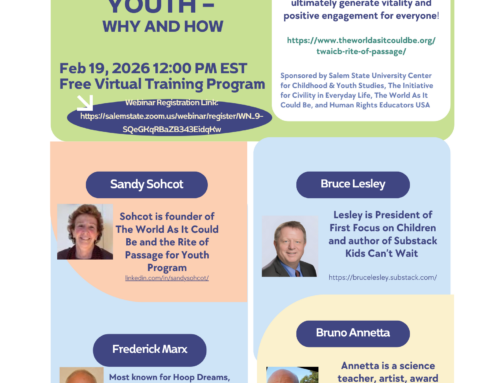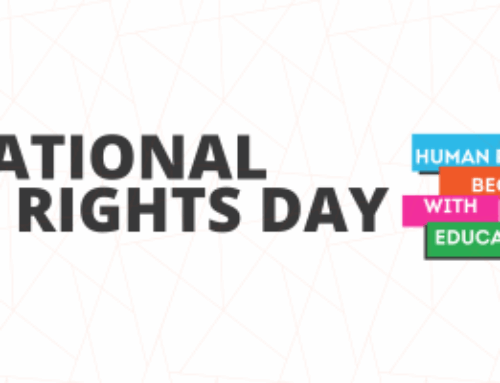By Sandy Sohcot
In March 2013 TWAICB presented a program with Frederick Marx on the importance of rites of passage for youth. The context for organizing the program was to bring attention to the concerns many of the youth raised during their UDHR town halls and culminating presentations about bullying, hateful actions and gun violence in their communities. We wanted to offer ideas to help have our youth be leaders in forging the change in thinking and action needed to move away from violence, toward positive problem solving and conflict resolution. Frederick presented information on the importance of rites of passage to help youth feel a positive sense of belonging and support from the adults around them. This presentation inspired the creation of The World As It Could Be Is Within Reach rite of passage that began at the REACH Ashland Youth Center in September 2014.
We have seen over the years how the youth participating in these rites of passage programs have been positively impacted, we believe that there is now an even more urgent need to raise greater awareness about why rites of passage for youth are essential to the health and well-being of not only the youth, but also to that of the community as a whole. The youth in our 2018-19 Rite of Passage program identified heightened stress and anxiety as the priority issue affecting experiencing their right to an education. Since that time, we have seen more and more news about the crisis among youth experiencing anxiety, depression, and loneliness, along with alarming rates of suicides.
Here are two sources of information about the growing concerns about our youth:
Annie E. Casey Foundation
Youth Mental Health Statistics July 25, 2025
American Psychological Association April/May 2025
U.S. teens need far more emotional and social support
The Annie E. Casey Foundation report includes a link to information about the factors contributing to Generation Z Mental Health, including:
Lack of life direction and purpose: The same Harvard study found that half of Gen Z young adults say their mental health is negatively affected by not knowing what to do with their lives, and almost three in five (58%) lacked meaning or purpose in their lives within the past month. Among young people ages 12 to 26, another 2023 Gallup survey found that the biggest driver of Gen Z happiness is their sense of purpose at either school or work, but 43% to 49% of Gen Zers “do not feel what they do each day is interesting, important or motivating.”
A need for connection with others: Sadly, more than two in five (44%) Gen Z young adults feel like they don’t matter to others, and one in three (34%) report loneliness, according to the same Harvard survey. This is corroborated by 2023 Gallup findings that about one in three Gen Zers ages 12 to 26do not often feel loved (31%) or supported (35%) by others, and a similar share (30%) always/often feel like nobody knows them well. This is especially troubling given that these young people are going through a vulnerable developmental stage, and evidence indicates that stable, supportive relationships are important for positive mental health.
We believe that having a greater awareness of what rites of passage are about and how to implement them would be a vital step forward in providing much needed support for our youth, particularly in helping provide them with a sense of belonging, of being loved, being cared for and celebrated by the adults around them, as well as having a sense of purpose and meaning. In addition to supporting our youth, such rites of passage provide the adults in our communities with an added sense of their importance as vital sources of positive connection and guidance to youth.
To this end, we are excited to now have the following resources available, written by Sandy Sohcot and Frederick Marx:
Community Based Rites of Passage – Why and How.
A virtual presentation of why rites of passage are vital elements to support healthy youth and vibrant communities, with resources to help implement them.
Community Based Rites of Passage – Getting Them Started and Keeping Them Going
A document providing step-by-step guidance on how to implement rites of passage in your community.
Rites of passages have been essential parts of indigenous, religious and cultural communities throughout time, though have not been fully recognized and valued in our secular, everyday world. We hope this is a start to igniting widespread appreciation for and implementation of this deeply meaningful process.
Let us know how we can help!
Sandy Sohcot at sandy@theworldasitcouldbe.org
Yvonne Vissing at yvonne@theworldasitcouldbe.org







